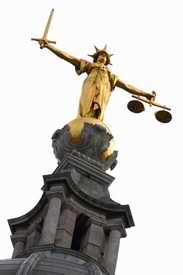 Fifty years ago this week, amid extraordinary international publicity, the Old Bailey was the venue for a trial that did more to shape 21st-century Britain than hundreds of politicians put together. The case of the Crown versus Penguin Books opened
on Friday, October 21, 1960, when courtroom officials handed copies of perhaps the most notorious novel of the century, D H Lawrence's book Lady Chatterley's Lover, to nine men and three women, and asked them to read it. They were not, however, allowed
to take the book out of the jury room. Only if Penguin were acquitted of breaking the Obscene Publications Act would it be legal to distribute it.
Fifty years ago this week, amid extraordinary international publicity, the Old Bailey was the venue for a trial that did more to shape 21st-century Britain than hundreds of politicians put together. The case of the Crown versus Penguin Books opened
on Friday, October 21, 1960, when courtroom officials handed copies of perhaps the most notorious novel of the century, D H Lawrence's book Lady Chatterley's Lover, to nine men and three women, and asked them to read it. They were not, however, allowed
to take the book out of the jury room. Only if Penguin were acquitted of breaking the Obscene Publications Act would it be legal to distribute it.
What followed, said one eyewitness, was a circus so hilarious, fascinating, tense and satisfying
that none who sat through all its six days will ever forget them . But it was a circus that changed Britain forever.
On November 2, after just three hours' deliberation, the jury acquitted Penguin Books of all charges. Almost immediately, the
book became a best-seller. In 15 minutes, Foyles sold 300 copies and took orders for 3,000 more. Hatchards sold out in 40 minutes; Selfridges sold 250 copies in half an hour. In one Yorkshire town, a canny butcher sold copies of the book beside his lamb
chops.
And yet there was another side to the story, often ignored by the history books. Outside intellectual high society, most ordinary people in 1960 remained deeply conservative, and the Home Office was flooded with letters of protest. In
Edinburgh, copies were burned on the streets; in South Wales, women librarians asked permission not to handle it; from Surrey, one anguished woman wrote to the home secretary, explaining that her teenage daughter was at boarding school and she was
terrified that day girls there may introduce this filthy book .
Comment: What an exaggerated article
From readers comments by IanBB
What an
exaggerated article. The fetters were off . Were they indeed? How then did Britain remain the most censored country in Europe, how then did Britain enact the infamous Video Recordings Act in 1984 that brought in Draconian censorship to stop people
watching a few erotic videos and bad foreign horror movies? How then did it take until the year 2000 to partially legalise real pornography- that is, showing the act itself- still under the rigorous control of that arch-quango, the BBFC?
How then
did the (Labour) government just last year bring in new censorship laws controlling mere cartoons, the breaking of which laws doesn't just mean a fine or a short prison sentence, but the total ruin of the convicted person via the Sex Offenders Register?
Offsite: The trial of Lady Chatterley's Lover
23rd October 2010. See
article from guardian.co.uk by Geoffrey Robertson
QC
 The Old Bailey has, for centuries, provided the ultimate arena for challenging the state. But of all its trials – for murder and mayhem, for treason and sedition – none has had such profound social and political consequences as the trial in 1960 of
Penguin Books for publishing Lady Chatterley's Lover . The verdict was a crucial step towards the freedom of the written word, at least for works of literary merit (works of no literary merit were not safe until the trial of Oz in 1971, and works
of demerit had to await the acquittal of Inside Linda Lovelace in 1977). But the Chatterley trial marked the first symbolic moral battle between the humanitarian force of English liberalism and the dead hand of those described by George Orwell as the
striped-trousered ones who rule , a battle joined in the 1960s on issues crucial to human rights, including the legalisation of homosexuality and abortion, abolition of the death penalty and of theatre censorship, and reform of the divorce laws. The
acquittal of Lady Chatterley was the first sign that victory was achievable, and with the guidance of the book's great defender, Gerald Gardiner QC (Labour lord chancellor 1964–70), victory was, in due course, achieved.
The Old Bailey has, for centuries, provided the ultimate arena for challenging the state. But of all its trials – for murder and mayhem, for treason and sedition – none has had such profound social and political consequences as the trial in 1960 of
Penguin Books for publishing Lady Chatterley's Lover . The verdict was a crucial step towards the freedom of the written word, at least for works of literary merit (works of no literary merit were not safe until the trial of Oz in 1971, and works
of demerit had to await the acquittal of Inside Linda Lovelace in 1977). But the Chatterley trial marked the first symbolic moral battle between the humanitarian force of English liberalism and the dead hand of those described by George Orwell as the
striped-trousered ones who rule , a battle joined in the 1960s on issues crucial to human rights, including the legalisation of homosexuality and abortion, abolition of the death penalty and of theatre censorship, and reform of the divorce laws. The
acquittal of Lady Chatterley was the first sign that victory was achievable, and with the guidance of the book's great defender, Gerald Gardiner QC (Labour lord chancellor 1964–70), victory was, in due course, achieved.